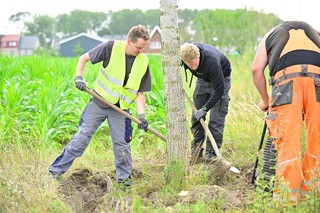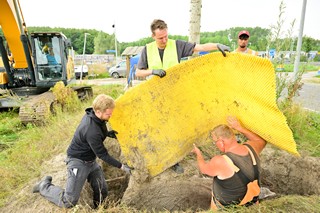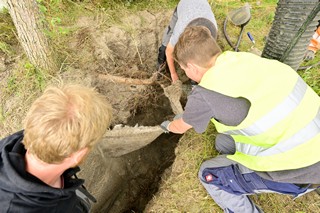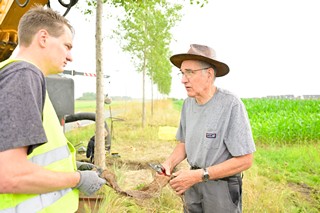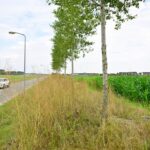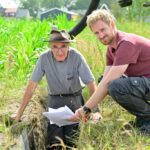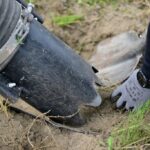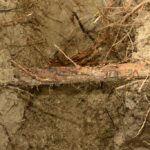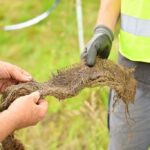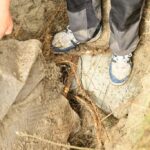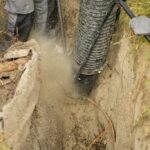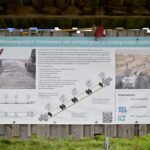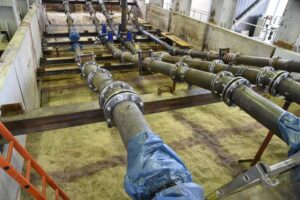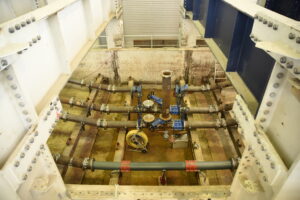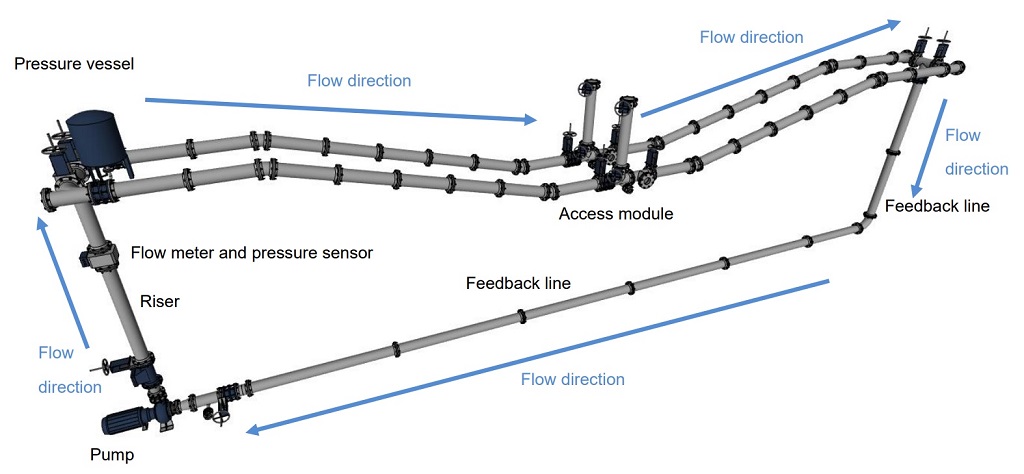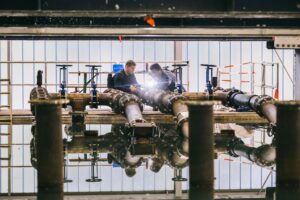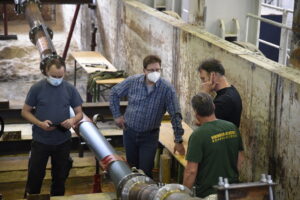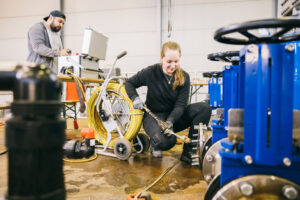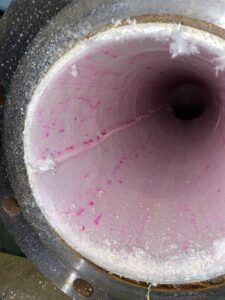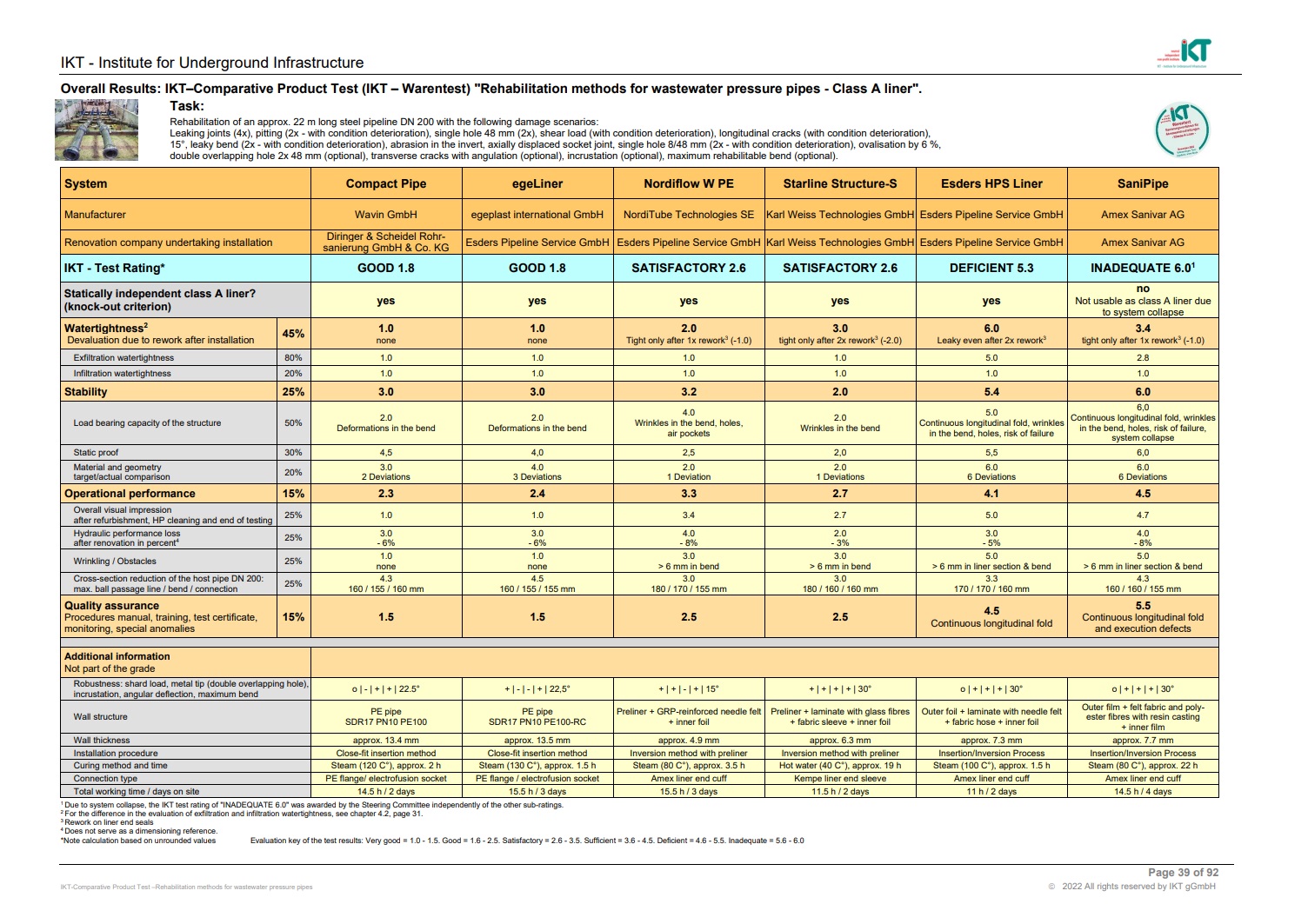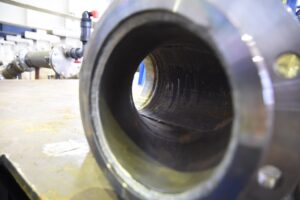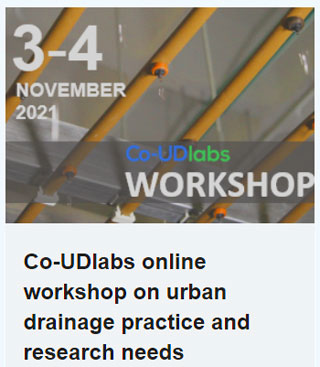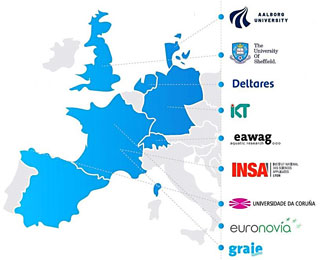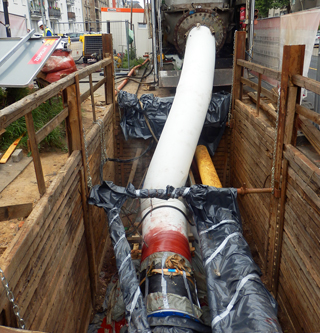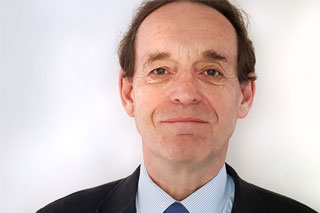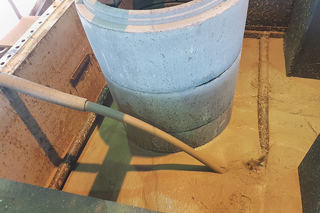
Which flowable backfill best meets the requirements of sewer network owners? IKT has compared five candidates.
We have evaluated with sewer network owners the
suitability of “Flowable Backfill” for use sewer trench backfilling in an
IKT-Compare evaluation of this technology. Five products were compared and all were found to flow well into 1:1 scale excavation pits in our large-scale test facility – around pipes and manholes shafts and into every corner of the simulated trenches. However, during the subsequent performance tests it became increasingly clear that only three suppliers had actually installed “Flowable Backfill”. One product more or less concreted over the test pit, another material took far too long to set and posed a risk to working safety. The results have now been made publicly available.
IKT-Compare evaluation of Flowable Backfill in Sewer Construction
Results table in English (PDF)
Product test report in German (PDF)
Flowable backfill is also known as „Controlled Low-Strength Material“ (CLSM) or „Temporarily Flowable, Self-compacting Backfill Material“ (TFSB, or ZFSV in Germany). These products can be used to fill a pipe trench quickly, without the need for compaction equipment. They have the potential to flow into every corner of the trench, to bed the pipes optimally and to then harden to such an extent that you can build a pavement or road on top. And, if you need to access the pipe again later, the material can be dug out again – in the ideal case.
Advantages and risks of using Flowable Backfill
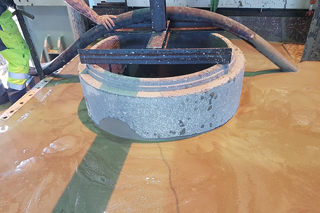
Flowable Backfill is useful, but the performace of different products is variable. Who has the best one?
The
demands on the material are high. What if the supplier does not quite meet the
optimum performance? What if after some time the road surface sinks, or in 20 years’ time you can no longer get to the pipe because the once-liquid soil is as hard as concrete?
It is not surprising that Flowable Backfills are popular. But, the enthusiasm of clients for their benefits often obscures awareness of the risks. IKT, as a neutral and independent institute, has considered these, working with with eleven committed wastewater network operators, to undertake a major comparative product test of the technology. So, in future wastewater network operators will know what to look out for when they order a Flowable Backfill.
Can a product deliver all the desired properties?
Five systems from five suppliers were tested under realistic, reproducible conditions in a large-scale test facility. After long and intensive preparation, the product test team spent a year testing, measuring, observing, evaluating and reporting. Now the results of this new IKT-Compare product test “Flowable Backfill in Sewer Construction”, funded by the NRW Environment Ministry, are available. The testing has basically confirmed the performance advantages of Flowable Backfill that network operators appreciate, but only if the formula and installation is correct.
It was found that all five materials were able to fill the trenches completely without voids – even when shoring removal was simulated after backfilling. The testers rated the pipe bedding provided by the products very positively, and a contribution to protection of pipes from tree roots can be expected from all the products. However, two Flowable Backfills failed to meet all criteria set by the steering committee (made up of wastewater network owners), as being essential for their use in sewer construction. One material hardened to such an extent that the required re-excavation capability was not achieved, another took far too long to achieve the strength required for building over, and also exhibited risks for re-excavating of the material and an unacceptable ammonia load during excavation.
Five participants at the start
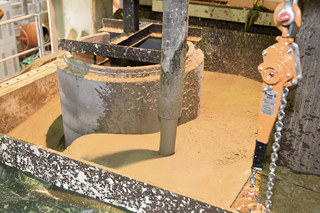
Everything in flux: When the flowable backfills were poured in, all was in order.
The five systems tested achieved
grades varying from GOOD (1.9) to INADEQUATE (6.0) (on a scale from 1 to 6) – see link to results table below. In terms of
quality, there are significant differences between the individual materials:
- Carbofill from Thomas Zement GmbH & Co KG – GOOD (score 1.9)
- RSS Flüssigboden from FiFB Research Institute for Flowable Backfill GmbH – GOOD (score 1.9)
- TerraFlow from Heidelberger Beton GmbH – SATISFACTORY (score 3.4)
- Terrapact by Holcim Beton und Betonwaren GmbH – INADEQUATE – cannot be used in sewer construction due to very poor re-excavation properties
- WBM-Flüssigboden by WBM-Flüssigboden GmbH – INADEQUATE – cannot be used in sewer construction due to slow hardening, poor recyclability and high ammonia values
Three reached the finish line, two fell by the wayside
The winner with the grade GOOD (1.9) was Carbofill from the manufacturer Thomas Zement, which only has a weakness worth mentioning in the test of walkability after filling. In second place, very close behind, comes the RSS liquid floor from the FiFB (Forschungsinstitut für Flüssigboden) research institute, also with a GOOD (1.9) rating. The material only had difficulties with the filling of the shoring removal simulation. TerraFlow from Heidelberger Beton received a low score for “re-excavation capability”, a devaluation of 1.0 grade points, but is otherwise on a par with the best performers. Overall, TerraFlow achieved a SATISFACTORY (3.4) and thus third place.
The Terrapact material from Holcim Beton und Betonwaren could only be removed from the test trench with great effort and heavy equipment. The result was an INADEQUATE in the criterion of re-excavation capability, and thus was found to be not suitable for use in sewer construction. The WBM-Flüssigboden material, on the other hand, had a problem with the criterion of hardening. It could only have been built over after considerably more than 28 days. In addition, the MAK value for ammonia was exceeded for this product (MAK = maximum allowable workplace concentration) and the recyclability was also inadequate. The verdict of the testers: INADEQUATE, not applicable in sewer construction.
Awarding of certificates: How the evaluation graded the products
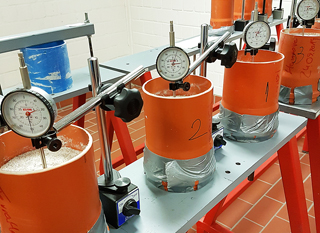
Supplementary laboratory tests provided the testers with a detailed picture of the properties of the candidate products.
The final scores in this IKT-Compare product test are based on the results from three main areas of evaluation: the 1:1 scale evaluations in the test pit and supplementary laboratory tests, in-situ investigations of the use of the product, and evaluation of the supplier‘s quality assurance system. The grade spectrum is based on the
German school grading system and ranges from VERY GOOD (1.0) to INADEQUATE (6.0).
Evaluation weightings
The evaluation comprised a weighting of 85 percent for the performance tests and 15 percent for quality assurance for the overall grade. The performance tests results were weighted for the three phases of application of the products: “installation phase” (40 percent), “use phase” (30 percent) and “disposal phase” (30 percent). The 15 percent total for quality was made up from consideration of five aspects: the delivery note, self-monitoring, quality certificates, and any other conspicuous observations on quality – each contributing 20 percent of the assessment of quality assurance.
Unscored additional information supplements the hard test data: pH value of the material (installation), viscosity balance (average shear strength on the 1st and 2nd day), time required for installation, location of mixing unit, distance between mixing unit and IKT, number of deliveries (total 50 m³), material costs, pumping costs, testing costs (self-monitoring), disposal costs.
Much effort was expended in order to provide users with valuable insights
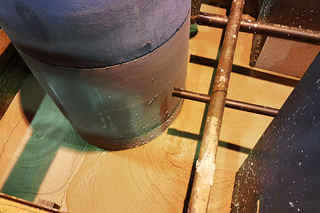
Construction of the 1:1 scale simulated excavations in the test pit: five concrete manhole shafts, five plastic manhole shafts, five sewer pipes, five crossing pipes, ten shoring boxes – and 30 tons of steel to make the trench walls.
For this IKT-Compare product test “Flowable Backfill in Sewer Construction”, the test hall team divided the Institute’s 15-metre long, six-metre wide and six-metre deep
large-scale test stand using 25 millimetre thick steel plates to create five test chambers.
Exactly the same construction of concrete manhole shafts, plastic manholes shafts and shoring boxes, as well as main, transverse and longitudinal pipes were installed in each chamber. The man-hours for installation alone added up to many weeks. Added to this is the time spent by IKT structural engineer Dr Mark Klameth on the calculations for the installations. A total of 30 tonnes of steel were used. Then the
suppliers came and pumped their Flowable Backfills into the compartments and the evaluations could begin.
Testing confirmed that Flowable Backfill has many advantages
All five materials flowed well into the trenches – a pleasure to watch as, like liquid lava (only not so hot), they glided elegantly into every corner, enclosed the pipes and manhole shafts, and filled the test stand up to the top. Satisfied faces were also to be seen on the construction sites that the evaluation team visited to gather in-situ impressions and experiences.
Extensive test programme
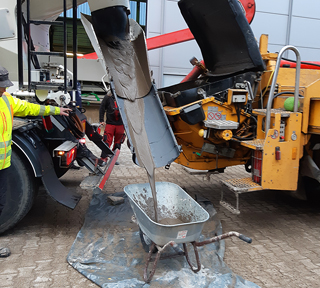
Start of the inspection programme: First samples taken during delivery
The
extensive testing programme began during the installation of the Flowable Backfills: the product test team determined the
consistency of the backfill, among other things, by means of a spreader gauge, checked the
shear strength with a visco-balance, measured the
pH value, filled the containers for a
3-segment cylinder test – which shows whether the suspension separates over time – and took samples for
cube pressure testing, which determines the
modulus of elasticity after seven days. This was followed by walkability tests,
load plate compression tests and the cube compression tests mentioned above. In further testing during the use and disposal phases, the product testers examined the
pipe bedding and the backfilling of the shoring removal simulation. The results of
eluate tests allowed the scientists to assess the
environmental compatibility of the materials. And the steering committee members evaluated the
ability of the soil to be removed using a spade by picking up the spade themselves and comparing the materials directly.
The steering committee – support at all levels
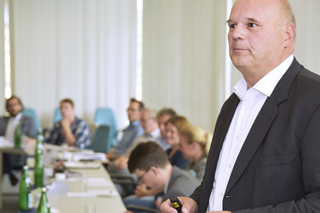
In regular steering committee meetings, the participants decided on the test requirements, among many other things.
The local steering committee is the
highest decision making authority in each IKT-Compare test. Only
wastewater network operators are entitled to participate. All
fundamental decisions are taken by the steering committee. The following local authorities participated in the IKT-Compare test “Flowable Backfill in Sewer Construction” in terms of both its content and financing:
- Technische Werke Burscheid (public utility company) as applicant/client
- Abwasserbetrieb Troisdorf (local sewage operator)
- Lippeververband (special purpose association) represented by Stadtentwässerung Hamm (sewer network operator)
- medl, Mülheim/Ruhr (public utility company)
- City of Gladbeck
- City of Recklinghausen
- SAL Stadtbetrieb Abwasserbeseitigung Lünen (local sewage operator)
- Stadtentwässerung Düsseldorf (municipal drainage operation)
- Technische Betriebe Solingen (municipal technical operations)
- Wirtschaftsbetriebe Oberhausen (municipal enterprises)/City of Oberhausen
- WSW Energie & Wasser, Wuppertaler Stadtwerke (public utility)
This project was generously funded and actively supported by the Ministry for the Environment, Agriculture, Nature and Consumer Protection of the State of North Rhine-Westphalia, Germany.
With exceptions, Flowable Backfill can be built over within 7 days
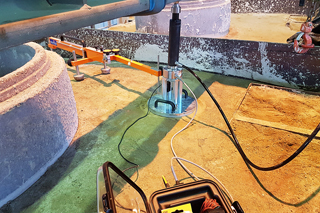
Under pressure: the load plate compression test was used to determine the modulus of elasticity of the installed Flowable Backfills.
A minimum value of 45 MN/mm² achieved in the load plate compression test is decisive for determining if
hardened Flowable Backfill can be built over. The measured EV2 values (modulus of elasticity) reached this value within the first week for four of the five products tested. However,
extremely high EV2 values can also indicate that the
final strength of the flooring may be too high for re-excavation.
In addition to the laboratory tests at IKT, the Flowable Backfills were also installed in trenches at a test site in Burscheid. Here and during further construction site investigations, the basic handling of the materials under practical conditions was recorded and any differences with the installations witnessed in the IKT large test facility was also checked. These observations were considered as part of the scoring for quality assurance.
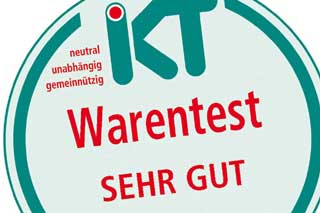 The IKT Product Test (Warentest) Seal
The IKT Product Test (Warentest) Seal
Product manufacturers and process providers who have taken part in an IKT product test can receive an IKT product test seal with the achieved result. This allows the quality of the product or process to be documented for customers.
more information about the “IKT-Warentest” seal
Quite OK: Quality assurance by contractors
In addition to the system tests of the Flowable Backfills in the test set-ups, the testers also examined the quality assurance provisions by the manufacturers. With few exceptions, the scores in this area show that the suppliers are making great efforts to ensure quality. But there is still a bit of room for improvement.
Special attention to meeting key performance criteria
The steering committee of the network operators defined early on the performance characteristics which must be met at all costs in order to ensure that a Flowable Backfill can be used in sewer construction. These concerned: the flowability in the installation phase, the build over capability in the utilisation phase and the re-excavation capability and potential for recycling in the disposal phase. Two out of five products proved to be defect-free in tests against all these criteria: Carbofill and RSS Flüssigboden. The remaining products, on the other hand, revealed visible or even serious defects, which in two cases led to the IKT-Compare test verdict “Inadequate”.
Quality assurance in the mixing plant is extremely important
In the test, the suppliers were asked to offer the products in such a way that their composition was clearly defined and that it was also possible to re-order them for future installations. Accordingly, the suppliers were free to choose the soil material to be used. In at least one case, however, an unsuitable soil material (organic matter, ammonia release, poor build over capability) was used in the performance tests. The network operators represented in the steering committee see the suppliers/manufacturers as responsible here for reliably determining the quality of the substances and soils used in their product and making this information transparent. Soil management and quality assurance in the mixing plant where the Flowable Backfill is produced are therefore of particular importance.
Conflicting objectives: need to firm up quickly, but not be too firm for later re-excavation
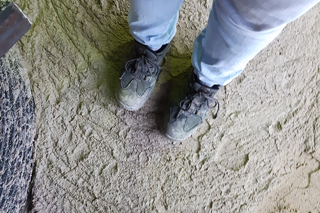
Quickly walked on, quickly built over, but later removeable: the demands on Flowable Backfills are high.
Obviously, for many suppliers there is a
conflict of objectives between rapid walkability and buildability and the later re-excavation capability (using a spade) of the material. Only one provider (RSS Flüssigboden) succeeded in fulfilling these criteria in the system tests with very good or good results throughout. The four remaining suppliers showed clear deficiencies in at least one of these criteria in the test.
Pulling out the shoring can lead to massive surface fractures
Pert of the evaluation involved the removal of simulated shoring from the test trenches. In individual cases, pulling the shoring led to massive surface fractures, which can lead to uncertainty at the construction site about the success of the backfilling process and necesitate. However, in the testing, the observed cases did not show any effects on the load situation in the subsoil. Where fractures did occur, the manufacturers are required to adapt the materials accordingly or to specify suitable times for pulling the shoring.
Quality assurance on the construction site
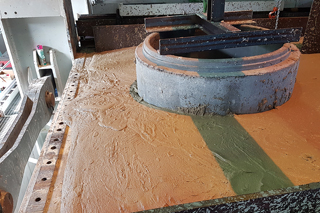
Appeal to users: check the most important quality issues on the construction site!
The test results show that there are important assessment criteria that should be checked in construction site practice in the course of
internal and external monitoring of a Flowable Backfill installation. This applies in particular to the flowability, walkability, build over ability, and bedding properties as well as the lifting of shoring. Furthermore, the manufacturer should provide the composition of the materials used, including the soil material, in a transparent and verifiable manner. It may also be appropriate to check the homogeneity of deliveries to site, i.e. the extent to which variations in properties between batches can be observed.
In the run-up to this product test, 16 manufacturers of Flowable Backfill were researched who offer their products for use in sewer construction. However, only six suppliers were in a position to offer a nationwide service such that the product could be used in North Rhine-Westphalia for both the test fields in Burscheid and in the performance tests at IKT in Gelsenkirchen. Moreover, one of these products was not pumpable at the time of the award of the contract, so ultimately only five products were used and compared in the system tests. Consequently, an expansion of the delivery areas for more products and also new and further developments of products are desirable. IKT testing could then underpin their quality.
Possibility for retesting
Not been involved in this product test? Your material can do that too? Then there is an opportunity to prove it in follow-on testing – the same tests under the same conditions with the same evaluation criteria. At the end there is a score and a place in the results table. And if you want, you can also get a seal.
Talk to us!
Improving the image of Flowable Backfill
The IKT-Compare product test shows that in principle, Flowable Backfill is already a suitable technology for sewer construction. Not for all products, but compositions can be optimised, and at some point the ideal case will become the norm.
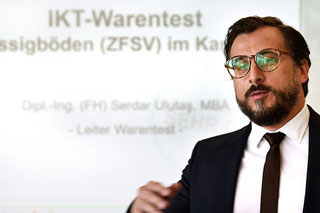
Serdar Ulutaş, Head of IKT-Compare, presents the results in detail.
(PDF)
Download the product test report (in German) (PDF)
Contact persons
Dipl.-Ing. (FH) Serdar Ulutaş, MBA
Head of IKT Product Testing
phone: +49 209 17806-32
e-mail: ulutas@ikt.institute
Dr Iain Naismith
IKT Project Manager UK and International
phone: +44 7983 605219
e-mail: naismith@ikt.institute
Neutral and independent: The IKT-Compare Product Tests
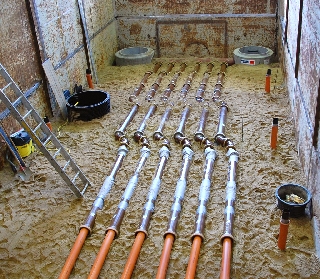
In the independent IKT-Compare products tests, products or processes are tested comparatively under identical, reproducible conditions.
The aim of the IKT-Compare products tests is to provide network operators with
reliable and independent information on the characteristics of products and processes available on the market. Details in process descriptions and advertising information of the providers are subjected to independent and neutral testing by the IKT-Compare products test.
The focus is on the suitability of products under long-term operating conditions. In particular, stresses occurring during operation are investigated that the products will be exposed in practice for decades.
Today, the warranty period for sewerage technology products is a maximum of five years. This is a very short period of time compared to the intended useful lives. Of particular disadvantage for clients are damages that only occur after the warranty period has expired. Recourse to the supplier is only possible in the rarest of cases. This results in a considerable financial risk for the network operators, which can be reduced by the comparative IKT-Compare products tests.
An IKT-Compare products test is always overseen by a group of network operators, the steering committee. This steering committee decides in regular meetings on:
- the selection of products or processes for the first test series
- the construction or maintenance task for the use of the products or processes in the test
- the relevant performance targets and quality requirements
- the scope and focus of the evalution programme
- the exchange of information with the suppliers of products or processes
- the evaluation and publication of the results
The actual testing and documentation of the results is carried out by IKT as an independent institute. Within the scope of the testing, IKT is responsible in particular for the engineering development and implementation of the test setups and the test programme. Decisions in this respect are made in direct coordination with the steering committee.
more about IKT-Compare products testing
to the downloads of the IKT-Warentest reports





